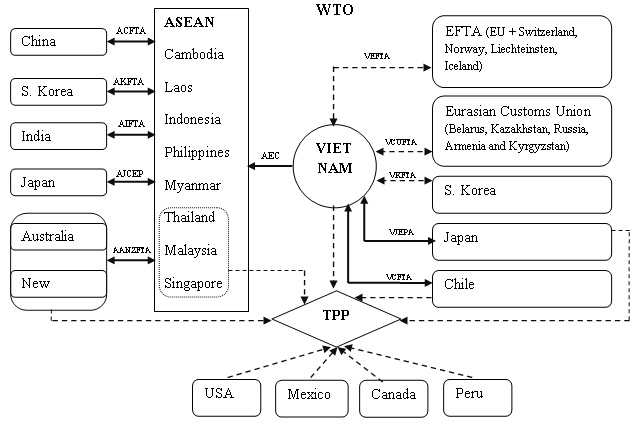
[7 July 2015] — Food Processing Industry is an important sector of Vietnam’s economy. The industry has witnessed vigorous growth in the last decades. In 2012 the industry produced about 20% of the country’s GDP. The value of its exported products reached 18.1 billion USD. As Vietnam is integrating increasingly into the world economy, the Free Trade Agreements (FTAs) and the Bilateral Investment Treaties (BITs) which the country are adhering to will bring about both advantages and challenges to industry in Vietnam.
In order to assist Vietnam Government to strengthen the policy framework supporting the Food Processing Industry and the Electronic Industry, ActionAid Vietnam has cooperated with the Central Institute for Economic Management (CIEM) to carry out a research about the Impacts of the Implementation of FTAs and BITs on the two industries. Thanks to its expertise and experience in economic policy research, Economica was entrusted by ActionAid and CIEM to carry out the research component in the Food Processing Industry.

The study aims to clarify the policy framework of Vietnam in supporting the industry to achieve its long-term development. It also helps to analyze the impacts of the implementation of the FTAs and BITs on the development of the industry. The study was expected to make recommendations for improve and strengthen the Government policy to help the industry to take the advantages of FTAs and BITs and at the same time is able to prevent the negative impacts of this global integration. Economica's research included desk study and a field study in the Mekong Delta Region with focus on An Giang Province.
The report has a summary of the commitments of FTAs and BITs that Vietnam has adhered to or are negotiating, the policy framework for the long-term development and global integration of the Food Processing Industry.
FTAs to which Vietnam joined or are negociating

Besides analyzing benefits of FTAs and BITs, the study also highlights negative impacts of the commitments toward the industry. For example, the sanitary and phytosanitary (SPS) requirement is very strict in the major markets like the US, EU, Japan. The aspects of rules on specifications of technical barriers to trade (TBT) are also controlled very strictly. The processed food exporting business will have to face the risks of being punished by the trade defence measures of the importing countries including anti-dumping and anti-subsidy duties. Due to tariffs reduction, the domestic processing industry is now under strong competition from imported products. Together with pointing out the positive impacts of the policy framework towards the industry, the study also raises important policy issues which need to be addressed soon to support the industry in the process of global integration.
The local authorities of An Giang have actively carried out the changes in local policy to respond to the commitments of FTAs and BITs. However, till the moment, they have been struggling to find ways to solve several problems of the industry locally. Though being considered as the bridge between the authorities and the business the business association has not obtained the position expected by the member business and they are not empowered to be able to function as referees or coordinators in the industry. The performance of linkage role is also dim and they are not active in policy consultation.
The business community in An Giang is very excited with the integration but they lack of the necessary information. The linkage among the industry’s business is weak, thus reduce the competitiveness of the industry. They have not paid sufficient attention to the development of branding. For coping with the requirements of SPS or TBT, they need more guidance and assistance from authority.
In order to support to business in Food Processing Industry to cope with the impacts of the commitments of FTAs and BITs realistically, the research proposes the policy intervention including: (1)To develop a reasonable policy for controlling the price of livestock feeding materials; (2)To have policy in empowering for improving the role and position of business associations in order to help the Government to implement the supports to business which the Government is banned to do as committed in FTAs and BITs; (3)The policy for supporting the business and locality to develop the branding of major products is needed; (4)The last recommendation is the policy for supporting business in improving the fulfilment of SPS.
The study was presented by Economica experts at a workshop to be co-organized by CIEM and ActionAid in June 2015.
 Support to Implementation of World Bank-executed Trust Fund (BETF) on Market Institutional Reforms (05/04/2015)
Support to Implementation of World Bank-executed Trust Fund (BETF) on Market Institutional Reforms (05/04/2015)
 Lao Cai District Competiveness Index (DCI) Report Completed (18/03/2015)
Lao Cai District Competiveness Index (DCI) Report Completed (18/03/2015)
 Final evaluations of two ILO projects on social and unemployment insurance (21/01/2015)
Final evaluations of two ILO projects on social and unemployment insurance (21/01/2015)
 Execution of ADB TA for Strengthening Microfinance Sector (08/12/2014)
Execution of ADB TA for Strengthening Microfinance Sector (08/12/2014)
 Development of the M&E Framework for the MPI - WB Inclusive Innovation Project (24/08/2014)
Development of the M&E Framework for the MPI - WB Inclusive Innovation Project (24/08/2014)
 Support to DICA Myanmar in Process Mapping, Reforms and Capacity Building (24/08/2014)
Support to DICA Myanmar in Process Mapping, Reforms and Capacity Building (24/08/2014)
 Documentation of the “Developing Business with Rural Poor in Cao Bang” (22/06/2014)
Documentation of the “Developing Business with Rural Poor in Cao Bang” (22/06/2014)
 Effective Business Associations for Dynamic and Inclusive Growth in Vietnam (05/05/2014)
Effective Business Associations for Dynamic and Inclusive Growth in Vietnam (05/05/2014)
 Exchange Forum with ECOSOCC from the Kingdom of Cambodia on RIA (05/04/2014)
Exchange Forum with ECOSOCC from the Kingdom of Cambodia on RIA (05/04/2014)
 Implementation of a Study on PCI and Economic Governance in the Northern Upland (23/03/2014)
Implementation of a Study on PCI and Economic Governance in the Northern Upland (23/03/2014)